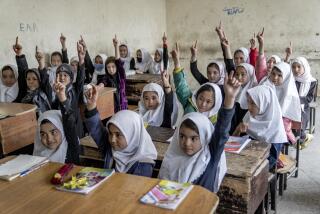In Kabul, a world away from war
- Share via
KABUL, AFGHANISTAN — In a fantastical little school here, girls and boys leave their impoverished, war-torn world and enter a utopia where they laugh and sing and learn to juggle and ride unicycles.
More than 100 children mix regular schooling with art and acrobatics at the Mobile Mini Circus for Children, set up by a Danish performance artist to bring fun and color to the lives of youngsters accustomed to poverty and violence.
“Nothing negative should come here. We try to cut off the misery,” said David Mason, 42, who moved to the Afghan capital and founded the school in June 2002, months after the fall of the fundamentalist Taliban regime. “The circus makes children enjoy life. It shocks them, moves them and makes them see how life can be.”
The school’s brightly colored buildings are a contrast to the drab, brown mud-brick of Kabul, where women and children often have to beg to survive.
Visitors with guns -- including foreign soldiers and Afghans with armed bodyguards -- are strictly forbidden, as are their donations. The circus school, which provides free classes, survives on money raised from its performances and donations from 15 countries.
Seventeen Afghan teachers give instruction in subjects such as math, English and religion as well as theater, painting and circus tricks. There are about 120 permanent students, ages 4 to 13, but the number swells to 350 when state schools close for the winter holiday.
One schoolroom -- a circular glass greenhouse -- is filled with a gaggle of girls juggling tennis balls and bowling pins. In another room, boys stand on their hands and do acrobatic flips. Children sing to the accompaniment of teachers playing the harmonium and tabla drums.
Habeda, 11, walks three miles from her home to attend the school with one of her three brothers. Although adult female performers still cause something of a stir in this conservative Muslim nation, she dreams of becoming a singer one day.
“I am learning music. I went to Germany, Denmark and Japan. I sang Afghan and Japanese songs there and everybody was clapping for me. I was very happy,” she said. “I want to show to the world the real face of Afghanistan. We have songs, we have theater, we have circus and we have Afghan national dance.”
Guest circus performers from France, Japan, Germany and the United States have held special workshops, and about 10 of the most talented students join the school’s circus, which has performed for tens of thousands of people during two-month tours of Japan and Europe.
“When a 7-year-old boy is on stage and 2,000 people are clapping for him, it gives him what war and misery cannot take away from him,” Mason said.
In 2005, the school sent troupes of about a dozen boys and girls to spend two months in Germany and two months in Denmark, performing acrobatics, theater, music and Afghan national dance for children in schools and at cultural shows. Last year, a troupe toured Japan.
“I went to Japan and I performed acrobatics and theater for children,” said Mohammed Ansar, 8. “There were 5,000 children looking at me. I was surprised and happy. I want to go to as many countries as I can and show them what I have learned.”
Mohammed is learning acrobatics, acting and drawing. “My father always tells me to learn more and more and be a good student of your school,” he said. “I want to participate in circus and make other children happy by doing acrobatic activities and showing them good theater.”
The school’s teachers and children also put on circus shows and do educational theater around Afghanistan, teaching other kids about land-mine awareness, malaria prevention and even the importance of brushing their teeth.
Afghanistan has a long tradition of theatrical storytelling, but the circus is an imported art form, previously seen in visiting troupes from Russia and Tajikistan.
The fun side of learning also is new for most children in Afghanistan, where schooling is often by rote and more than half the country’s 12 million youngsters still don’t attend school, according to the aid group Oxfam.
That’s still a lot better than in Taliban times, when girls were forbidden from going to school, and children were banned from playing with marbles and kites.
Before coming to Kabul, Mason was traveling the world, teaching salsa and tango. After the Sept. 11 attacks led to a U.S. offensive against the Taliban for harboring Osama bin Laden and Al Qaeda camps, he changed his mission to help the underprivileged children of Afghanistan.
“For us, medicine is jumping and laughter, and education is balancing and juggling,” Mason said, smiling in his sunlit, bright yellow office.
Associated Press writer Rahim Faiez contributed to this report.
More to Read
Sign up for The Wild
We’ll help you find the best places to hike, bike and run, as well as the perfect silent spots for meditation and yoga.
You may occasionally receive promotional content from the Los Angeles Times.






